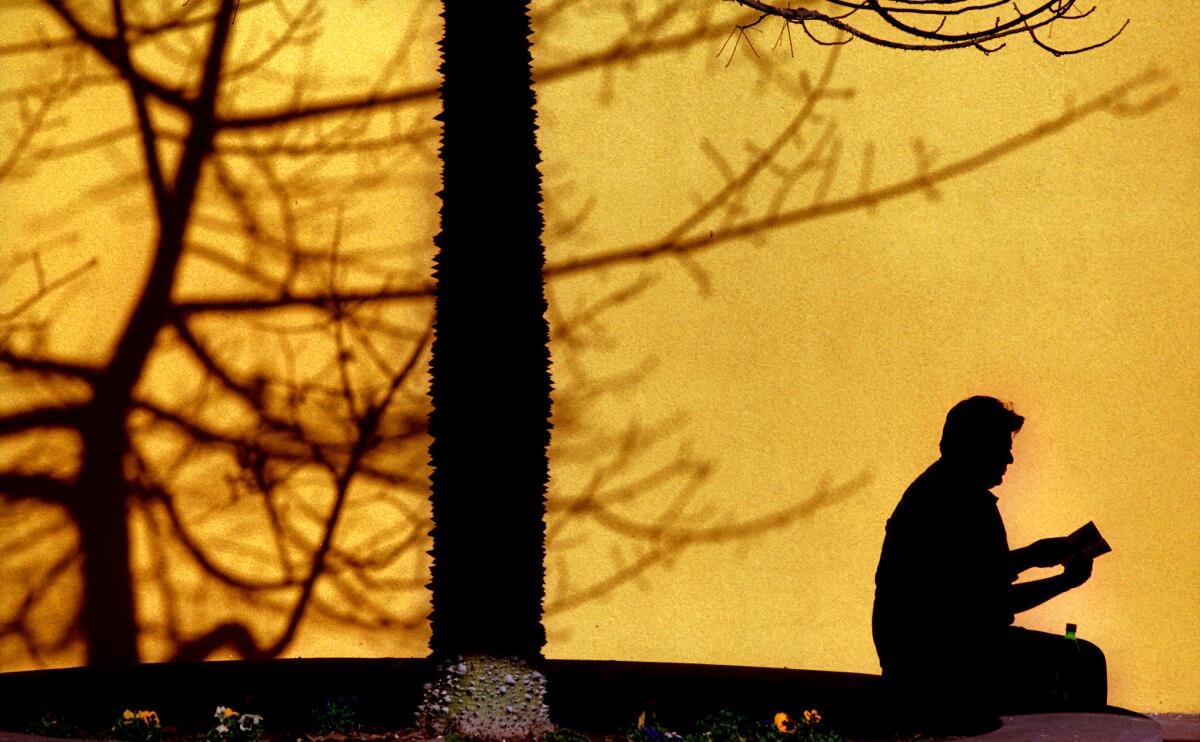The implications of Banned Books Week

- Share via
I’ve long had complicated feelings about Banned Books Week. It’s not that I’m in favor of banning books, just the opposite. For me, “free expression” is among the clearest phrases in the English language, and I believe we have the right to say and publish anything — even, or especially, work whose “redeeming social importance” is not clear.
Why, after all, do we turn to art or literature? To be comforted or to be provoked? For me, the answer is, as it has always been, the latter: to see the world through a diverging set of eyes.
As Franz Kafka wrote more than a century ago, “I think we ought to read only the kind of books that wound and stab us. If the book we’re reading doesn’t wake us up with a blow on the head, what are we reading it for? So that it will make us happy, as you write? Good Lord, we would be happy precisely if we had no books, and the kind of books that make us happy are the kind we could write ourselves if we had to. But we need the books that affect us like a disaster, that grieve us deeply, like the death of someone we loved more than ourselves, like being banished into forests far from everyone, like a suicide. A book must be the axe for the frozen sea inside us. That is my belief.”
What does this mean in terms of Banned Books Week? First, I think, we must acknowledge that books can be dangerous. The people who want to ban them (or restrict their access, since in the United States, there’s no real overt book banning) understand this; it’s the basis of their critique.
When a parent group goes after Dav Pilkey, for instance — or John Green, or Toni Morrison — it’s not necessarily because they’re ignorant, that if they knew more, or understood more, they would see things through a more accepting lens. They understand the power of books and are reacting to it, if not in the manner we might prefer. This, too, is what literature teaches us: that there is no single way of thinking about, of participating in, of framing our experience of the world.
That’s a scary thought to a lot of people on either side of the equation — cultural relativism, the notion that, to quote Franz Boas, “our ideas and conceptions are true only so far as our civilization goes.” What it suggests is that we must discover and define meaning on our own terms, that there is no absolute, no deity or leader, to show us the way.
Personal responsibility, in other words, not only for our actions but also for our thinking, for what we believe in, what we hope and what we fear. This, to me, is the place where narrative begins — with the need to tell stories as a strategy for making meaning in a universe that remains indifferent to us.
Of course, once you accept this worldview, it renders everything conditional, even good and evil, morality. It is left to us to make a choice. On the one hand, there is Camus, who, in “The Myth of Sisyphus,” argues that “[w]e must simultaneously serve suffering and beauty”; on the other, Hitler, whose “Mein Kampf” (the most unspeakable book of the last century) tends to fall out of the conversation when the subject of banned books comes up.
In my library, there is a place for both titles, not because they are alike but because they are not. It’s impossible, I think, to have one without the other: courage and cowardice, hope and hate. The issue is not one of license, nor (as should go without saying) agreement, but rather of responsibility.
To own “Mein Kampf,” to support its right to exist, is not to endorse its awful venality. Rather, it is to recognize that, as Henry Miller once wrote, “[y]ou cannot eliminate an idea by suppressing it.” This is a notion that, if we face it openly, offers us a vivid freedom — not to do anything, but to do the right thing.
Camus, of course, understood this, which is what makes him such a moral visionary.
“One of the temptations of the artist,” he writes, “is to believe himself solitary, and in truth he bears this shouted at him with a certain base delight. But this is not true. He stands in the midst of all, in the same rank, neither higher nor lower, with all those who are working and struggling. His very vocation, in the face of oppression, is to open the prisons and to give a voice to the sorrows and joys of all. This is where art, against its enemies, justifies itself by proving precisely that it is no one’s enemy. By itself art could probably not produce the renascence which implies justice and liberty. But without it, that renascence would be without forms and, consequently, would be nothing. Without culture, and the relative freedom it implies, society, even when perfect, is but a jungle.”
Twitter: @davidulin
More to Read
Sign up for our Book Club newsletter
Get the latest news, events and more from the Los Angeles Times Book Club, and help us get L.A. reading and talking.
You may occasionally receive promotional content from the Los Angeles Times.










